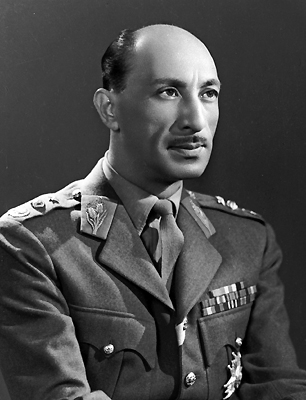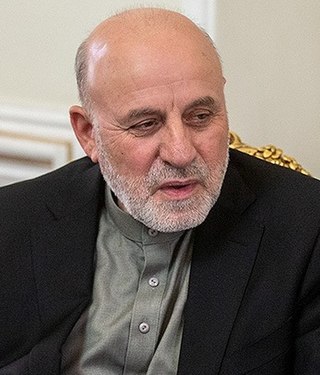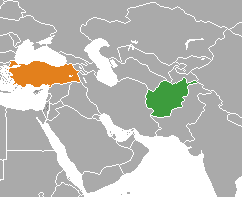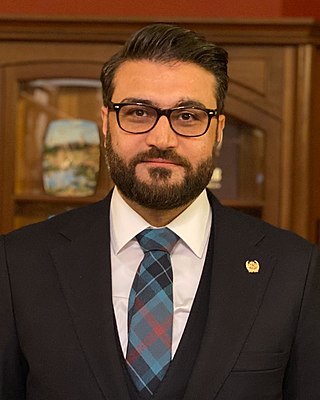Mohammad Yahya Maroofi (or Maroufi) (born March 5, 1939, in Kabul) is an Afghan ethnic Pashtun from the Barakzai tribe. His family is from District Maroof Kandahar, Afghanistan.
Mohammad Yahya Maroofi (or Maroufi) (born March 5, 1939, in Kabul) is an Afghan ethnic Pashtun from the Barakzai tribe. His family is from District Maroof Kandahar, Afghanistan.
He was nominated on February 2, 2002, as special adviser to Hamid Karzai, [1] President of the Interim Government of Afghanistan. Maroofi has been re-conduct on August 5, 2002, in his position following the re-election of Karzai as President during the Loya Jirga in June 2002. On November 1, 2004, Maroofi served as Ambassador of Afghanistan to Scandinavia, resident in Oslo between 2005 and 2007. From May 2007 to August 2009 he was appointed as Afghan Ambassador to the Islamic Republic of Iran. [2] In September 2009 Mr. Yahya Maroofi was elected Secretary General of the Economic Cooperation Organization (ECO). On the termination of his assignment as Secretary General of ECO on 13 August 2012 Mr. Maroofi was reappointed as Minister, Adviser to the president of Afghanistan on International Relations. He assumed this function till the end of President Karzai's second term in office (2014). During his assignment, Mr. Maroofi has taken active part in numerous international meetings and conferences and traveled extensively throughout the world representing Afghanistan. His numerous essays and collection of speeches are recorded in the archive of ECO, IOM and Ministry of Foreign Affairs of Afghanistan.
Prior to returning to Kabul in 2002, Mr. Maroofi worked with the International Organisation for Migration as Executive Director for Asia (from 1997 to 2001) and Special Envoy responsible for dossiers involving Afghan refugees in Iran, Pakistan and Tajikistan. Maroofi started in the Organization for Migrations as a Consultant for refugees matters in Africa after he and his family had left Afghanistan further the Soviet invasion. Maroofi took care of dossiers involving cross border refugees during political crisis in Iraq, Kenya, Tanzania and Somalia from 1985 to 1992. Currently he is the general secretary of Economic Cooperation Organization.
Maroofi started his career in the Afghan diplomatic service where he held numerous positions. His last post was Director of the Department of International Relations and United Nations Affairs. After the Soviet invasion, Mr. Maroofi and his family sought refuge in Switzerland. Mr. Maroofi is married to Mrs. Soraya Ludin Maroofi. They have two children, a son names Yama and a daughter names Sabrina.
Maroofi graduated in Law from Kabul University, holds a master's degree in International Relations from the University of Sydney and a master's degree in International Law from the Fairleigh Dickinson University, New Jersey.

Burhānuddīn Rabbānī was an Afghan politician and teacher who served as president of Afghanistan from 1992 to 1996, and again from November to December 2001.

Mohammad Zahir Shah was the last King of Afghanistan, reigning from 8 November 1933 until he was deposed on 17 July 1973. Ruling for 40 years, Zahir Shah was the longest-serving ruler of Afghanistan since the foundation of the Durrani Empire in the 18th century.

Hamid Karzai is an Afghan statesman who served as the fourth president of Afghanistan from July 2002 to September 2014, including as the first elected president of the Islamic Republic of Afghanistan from December 2004 to September 2014. He previously served as Chairman of the Afghan Interim Administration from December 2001 to July 2002. He is the chief (khān) of the Popalzai Durrani tribe of Pashtuns in Kandahar Province.

Zalmay Mamozy Khalilzad is an American diplomat and foreign policy expert. Khalilzad was U.S. special representative for Afghanistan reconciliation from September 2018 to October 2021. Khailzad was appointed by President George W. Bush to serve as United States ambassador to the United Nations, serving in the role from 2007 to 2009. Khalilzad was the highest ranking Muslim-American in government at the time he left the position. Prior to this, Khalilzad served in the Bush administration as ambassador to Afghanistan from 2004 to 2005 and Ambassador to Iraq from 2005 to 2007.

Mohammad Qasim Fahim was an Afghan military commander and politician who served as Vice President of Afghanistan from June 2002 until December 2004 and from November 2009 until his death. He was considered a powerful and influential figure during the Karzai Administration.

Relations between Afghanistan and the United States began in 1921 under the leaderships of King Amanullah Khan and President Warren G. Harding, respectively. The first contact between the two nations occurred further back in the 1830s when the first recorded person from the United States explored Afghanistan. The United States government foreign aid program provided about $500 million in aid for economic development; the aid ended before the 1978 Saur Revolution. The Soviet invasion of Afghanistan in 1979 was a turning point in the Cold War, when the United States started to financially support the Afghan resistance. The country, under both the Carter and Reagan administrations committed $3 billion dollars in financial and diplomatic support and along with Pakistan also rendering critical support to the anti-Soviet Mujahideen forces. Beginning in 1980, the United States began admitting thousands of Afghan refugees for resettlement, and provided money and weapons to the Mujahideen through Pakistan's Inter-Services Intelligence (ISI). The USSR withdrew its troops in 1989.
Mohammad Daoud was the governor of Helmand in Afghanistan until he was removed from his post for his ties to the opium trade. Daoud was appointed in December 2005, and replaced in December 2006 after the insistence of the British ISAF troops. The U.S. used the warlords to help them hunt Al Qaeda and the Taliban and it is rumored this extended to ignoring their involvement in the production and sale of opium.
The following lists events that happened during 2002 in Afghanistan.
The following lists events that happened during 2004 in Afghanistan.

Kai Aage Eide is a Norwegian diplomat and writer. He was appointed the United Nations Special Representative to Afghanistan and Head of the United Nations Assistance Mission in Afghanistan (UNAMA) on 7 March 2008, a position he held until March 2010 when Staffan de Mistura took over.

Afghanistan–Pakistan relations refer to the bilateral ties between Afghanistan and Pakistan. In August 1947, the partition of British India led to the emergence of Pakistan along Afghanistan's eastern frontier, and the two countries have since had a strained relationship; Afghanistan was the sole country to vote against Pakistan's admission into the United Nations following the latter's independence. Territorial disputes along the widely known "Durand Line" and conflicting claims prevented the normalization of bilateral ties between the countries throughout the mid-20th century. Various Afghan government officials and Afghan nationalists have made irredentist claims to large swathes of Pakistan's territory in modern-day Khyber Pakhtunkhwa and Pakistani Balochistan, which complete the traditional homeland of "Pashtunistan" for the Pashtun people. Afghan territorial claims over Pashtun-majority areas that are in Pakistan were coupled with discontent over the permanency of the Durand Line which has long been considered the international border by every nation other than Afghanistan, and for which Afghanistan demanded a renegotiation, with the aim of having it shifted eastward to the Indus River. During the Taliban insurgency, the Taliban has received substantial financial and logistical backing from Pakistan, which remains a significant source of support. Nonetheless, Pakistan's support for the Taliban is not without risks, as it involves playing a precarious and delicate game. Further Afghanistan–Pakistan tensions have arisen concerning a variety of issues, including the Afghan conflict and Afghan refugees in Pakistan, water-sharing rights, and a continuously warming relationship between Afghanistan and India, but most of all the Taliban government in Afghanistan providing sanctuary and safe havens to Pakistani Taliban terrorists to attack Pakistani territory. Border tensions between Afghanistan and Pakistan have escalated to an unprecedented degree following recent instances of violence along the border. The Durand Line witnesses frequent occurrences of suicide bombings, airstrikes, or street battles on an almost daily basis. The Taliban-led Afghan government has also accused Pakistan of undermining relations between Afghanistan and China and creating discord between the neighbouring countries.

Mohammad Umer Daudzai is a politician in Afghanistan, who most recently served as President Ashraf Ghani's Special Envoy for Regional Consensus Building on Peace and as Head of the High Peace Council (HPC) Secretariat for a few months. He was later appointed President Ghani's Campaign Manager for the 2019 Presidential elections. After a career with international non-governmental organizations including the United Nations Development Program in Geneva, Daudzai started work as two term Chief of Staff of Afghan President Hamid Karzai from 2003 to 2005 and then from 2007 to around 2010. From 2005 until 2007, President Karzai appointed him as Afghan Ambassador in Iran. He then served as the Afghan Ambassador to Pakistan, tasked with advancing efforts to reach a political solution to the war in Afghanistan. In September 2013, Daudzai was asked to serve as Afghan Minister of Interior in Kabul and ensure security for the challenging 2014 presidential elections.
Mohammad Yousef Pashtun is an Afghan technocrat and politician. He served as Minister of Urban Development and Housing for two terms and as Governor of Kandahar province in 2003, replacing Gul Agha Sherzai under President Hamid Karzai's administration. In 2010, he was appointed as Senior Adviser to President Karzai on Construction, Mines, Water & Energy. In 2014, minister Pashtun continued to serve as Senior Adviser to President Ashraf Ghani. Yِousef Pashtun is also chairing the Kabul New City Development Authority Board.

Ahmet Davutoğlu has described bilateral relations between the Islamic Republic of Afghanistan and Turkey as "exemplary" even if the two countries do not border, but are close. Afghanistan was the second nation to recognize the Republic of Turkey, after the Soviet Union, on 1 March 1923.

Abdullah Abdullah is an Afghan politician who led the High Council for National Reconciliation (HCNR) from May 2020 until August 2021, when the Afghan government was overthrown by the Taliban. The council had been established to facilitate peace talks between the Islamic Republic of Afghanistan and the Taliban insurgents. Abdullah served as the Chief Executive of Afghanistan from September 2014 to March 2020, and as Minister of Foreign Affairs from December 2001 to April 2005. Prior to that, he was a senior member of the Northern Alliance, working as an adviser to Ahmad Shah Massoud. He worked as an ophthalmologist and medical doctor in the 1980s.

Relations between the Islamic Republic of Afghanistan and Tajikistan began in 1992. Afghanistan maintains an embassy in Dushanbe and a consulate in Khorugh. The current Afghanistan ambassador to Tajikistan is LTG. Mohammad Zahir Aghbar. Tajikistan maintains an embassy in Kabul and a consulate in Mazar-i-Sharif, Fayzabad and Kunduz. The current Tajikistan ambassador to Afghanistan is Sharofiddin Imom.

Afghanistan–Denmark relations refer to diplomatic ties between Afghanistan and Denmark. Afghanistan is represented in Denmark through its embassy in Oslo, Norway. Denmark used to have an embassy in Kabul until it was closed in 2021 due to the Taliban takeover of Afghanistan, that has not been recognized by any state in the world. In 2010 Denmark had 760 soldiers in Afghanistan. As of 2024, Denmark has no soldiers deployed in Afghanistan. The last Danish troops were withdrawn in June 2021. As of the third quarter of 2024, 21,822 Afghans live in Denmark.

An emergency loya jirga was held in Kabul, Afghanistan between 11 and 19 June 2002 to elect a transitional administration. The loya jirga was called for by the Bonn Agreement and Bush administration. The agreement was drawn up in December 2001 in Germany. Conducted under United Nations auspices, the talks at Bonn sought a solution to the problem of government in Afghanistan after the US ousted the Taliban government.
2003 in Afghanistan. A list of notable incidents in Afghanistan during 2003

Hamdullah Mohib is a Pashtun Afghan politician and former diplomat.
Obeid, who used to serve as the head of the Medical Faculty of the Kabul University, replaced Mohammad Yahya Maroufi who was Afghanistan's envoy to Tehran from 2007 to 2009.